HSLS offers classes on database searching, software applications such as Adobe Photoshop, bibliographic management, molecular biology and genetics, and library orientations. For more information, visit the online course descriptions.
Classes are held on the first floor of Falk Library (200 Scaife Hall) in classroom 1 and conference room B, and on the second floor in the Computer and Media Center classroom 2.
All classes are open to faculty, staff and students of the schools of the health sciences at the University of Pittsburgh and UPMC. Some classes are also held in the conference room at UPMC Shadyside Libraries.
No registration is required for any of these classes. Seating for classes is first-come, first-served, until the class is full. Classes marked with an asterisk (*) qualify for American Medical Association Category 2 continuing education credit. Class schedules are subject to change. Please consult the online class calendar for the most current information.
HSLS ORIENTATION
Introduction to HSLS Resources and Services at Falk Library
(Meet inside entrance to Library)
Offered upon request to groups or individuals. Call 412-648-8796.
CLASSES OFFERED UPON REQUEST AT UPMC SHADYSIDE LIBRARIES
Introduction to HSLS Services at UPMC Shadyside
Offered upon request to groups or individuals. Call 412-623-2415.
Finding Full-Text Articles at UPMC Shadyside
HSLS provides access to millions of full-text articles. It is not always easy to track these down. Learn strategies and tips that will help you save time and frustration when finding full text.
Offered upon request to groups or individuals. Call 412-623-2415.
SEARCHING DATABASES
PubMed Basics* (Falk Library Classroom 1)
Wednesday, July 7 9-10:30 a.m.
Tuesday, August 3 10-11:30 a.m.
Thursday, August 26 1-2:30 p.m.
Why use PubMed? (UPMC Shadyside Libraries)
Monday, July 19 9-10:30 a.m.
Focus on Behavioral Medicine: Searching in PsycINFO* (Falk Library Classroom 1)
Tuesday, August 24 1-2:30 p.m.
MOLECULAR BIOLOGY AND GENETICS RESOURCES
Gene Regulation Resources* (Falk Library Conference Room B)
Wednesday, July 7 1-3:30 pm.
Bioinformatics for Proteomics Studies* (Falk Library Conference Room B)
Wednesday, July 21 1-3 p.m.
Lasergene* (Falk Library Conference Room B)
Wednesday, August 4 1-3 p.m.
Literature Informatics* (Falk Library Conference Room B)
Wednesday, August 18 1-3 p.m.
SOFTWARE TRAINING
EndNote Basics (Falk Library Classroom 2)
(Note: This class is usually full. Please arrive 15 minutes in advance to ensure seating.)
Tuesday, August 10 11 a.m.-1 p.m. (Falk Library Classroom 2)
Tuesday, August 24 9 -11 a.m. (UPMC Shadyside Libraries)
Adobe Photoshop for Beginners (Falk Library Classroom 2)
Tuesday, July 6 10 a.m.-noon
Tuesday, August 3 10 a.m.-noon
PowerPoint for Beginners (Falk Library Classroom 2)
Wednesday, August 11 10 a.m.-noon
Advanced PowerPoint for Presentations (UPMC Shadyside Libraries)
Wednesday, August 18 10 a.m.-noon
PowerPoint for Beginners and Advanced PowerPoint (Falk Library Classroom 2)
Wednesday, July 14 10 a.m.-2 p.m.
The WOW Factor: PowerPoint for Posters (Falk Library Classroom 2)
Tuesday, July 27 10 a.m.-noon
LUNCH WITH A LIBRARIAN
These informal, brown-bag lunches are held in Falk Library Conference Room B. Bring your own lunch. Drinks and dessert are provided. For more information, visit the online descriptions.
My NCBI a PubMed Tool to Save You Time
Thursday, July 15 Noon-1 p.m.
Your Personal Paper Silo: Making a Dent
Monday, August 9 Noon-1 p.m.
Thursday @ Three HSLS UPMC Shadyside Libraries Information Series
These informal sessions are held in the UPMC Shadyside Libraries’ Conference Room.
The Nuts and Bolts of Publishing an Article: Resources and Strategies for Aspiring Authors
Thursday July 22 3-4 p.m.
Making a Dent in Your Personal Paper Silo
Thursday, August 19 3-4 p.m.
CUSTOMIZED CLASSES
Customized classes can be developed for your department, course, or other group.
LEARNING @ YOUR PACE
These online tutorials provide information on getting started at HSLS, focusing on the Web site and popular resources.




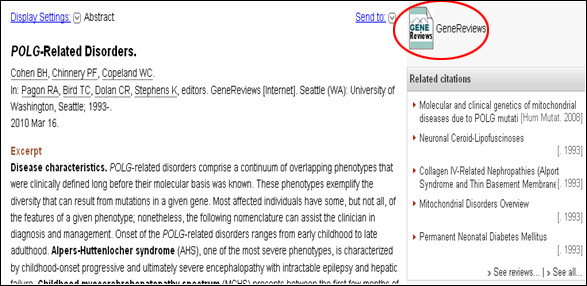
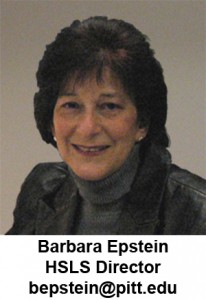 I recently returned from the Annual Meeting of the Medical Library Association in Washington, DC. This is a grand gathering of more than 2,000 health sciences librarians from large and small settings across the United States and beyond. I attended my first MLA meeting in Cleveland in 1975, and I’ve missed only two meetings since then. It’s an opportunity to “re-charge my professional batteries,” learn about emerging trends and technology, connect with colleagues, and see what’s going on in comparable library settings. While I used to lug home notebooks full of ideas for new projects, now my to-do list is electronic.
I recently returned from the Annual Meeting of the Medical Library Association in Washington, DC. This is a grand gathering of more than 2,000 health sciences librarians from large and small settings across the United States and beyond. I attended my first MLA meeting in Cleveland in 1975, and I’ve missed only two meetings since then. It’s an opportunity to “re-charge my professional batteries,” learn about emerging trends and technology, connect with colleagues, and see what’s going on in comparable library settings. While I used to lug home notebooks full of ideas for new projects, now my to-do list is electronic.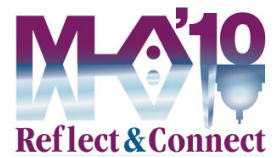 HSLS Librarians were active participants in the Medical Library Association’s Annual Meeting held in Washington, D.C. from May 21-26, 2010.
HSLS Librarians were active participants in the Medical Library Association’s Annual Meeting held in Washington, D.C. from May 21-26, 2010.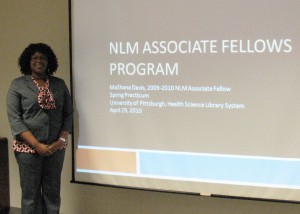 During the week of April 26, 2010, HSLS hosted MaShana Davis, a first year National Library of Medicine (NLM) Associate Fellow. The Associate Fellow program “is designed to provide a broad foundation in health sciences information services, and to prepare librarians for future leadership roles in health sciences libraries and in health services research.”
During the week of April 26, 2010, HSLS hosted MaShana Davis, a first year National Library of Medicine (NLM) Associate Fellow. The Associate Fellow program “is designed to provide a broad foundation in health sciences information services, and to prepare librarians for future leadership roles in health sciences libraries and in health services research.”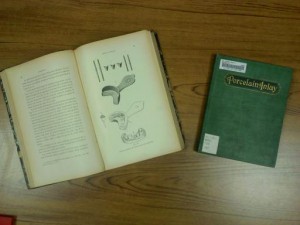 HSLS has a large number of rare books about dental health and oral surgery. The books described below, along with other rare gems, are currently on display in the Falk Library lobby and Rare Books Room.
HSLS has a large number of rare books about dental health and oral surgery. The books described below, along with other rare gems, are currently on display in the Falk Library lobby and Rare Books Room.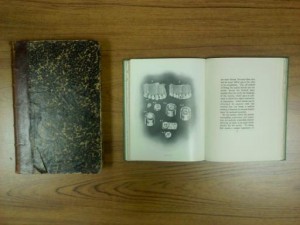 The wonderful and tiny 1843 and 1844 volumes of Dr. Hitchcock’s Teeth Almanac are miniature almanacs. These are normally housed in the Rare Books Room, though at 2 x 3.5 inches, they may easily be overlooked among the surrounding books. Take note of our smallest treasures as well as the rest of the rare dental medicine books in the exhibit.
The wonderful and tiny 1843 and 1844 volumes of Dr. Hitchcock’s Teeth Almanac are miniature almanacs. These are normally housed in the Rare Books Room, though at 2 x 3.5 inches, they may easily be overlooked among the surrounding books. Take note of our smallest treasures as well as the rest of the rare dental medicine books in the exhibit.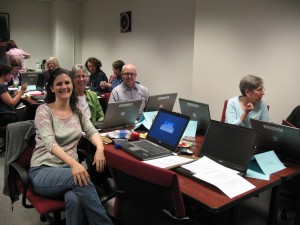 On April 19-21, 2010, HSLS offered another session of its popular Systematic Review Workshop: The Nuts and Bolts for Librarians. The focus of this intensive 2.5 day workshop is on literature search techniques for completing a successful systematic review. The first day examined why systematic reviews are done and how they contribute to the evidence base; publication bias and how a well-done literature search can overcome it; and, the librarian as collaborator and key player in the development of the systematic review’s literature search methodology. Day two examined which databases and grey literature resources to search as well as how to harvest literature search vocabulary. The last day looked at handsearching, project management and search delivery, and PRISMA (Preferred Reporting Items for Systematic Reviews and Meta-Analyses) guidelines.
On April 19-21, 2010, HSLS offered another session of its popular Systematic Review Workshop: The Nuts and Bolts for Librarians. The focus of this intensive 2.5 day workshop is on literature search techniques for completing a successful systematic review. The first day examined why systematic reviews are done and how they contribute to the evidence base; publication bias and how a well-done literature search can overcome it; and, the librarian as collaborator and key player in the development of the systematic review’s literature search methodology. Day two examined which databases and grey literature resources to search as well as how to harvest literature search vocabulary. The last day looked at handsearching, project management and search delivery, and PRISMA (Preferred Reporting Items for Systematic Reviews and Meta-Analyses) guidelines.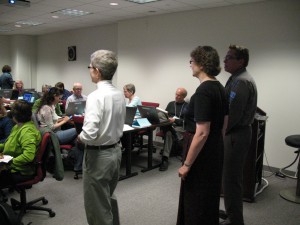 HSLS will offer this course again in July 2010 for librarians and informaticians from the National Institutes of Health and other Department of Health and Human Services facilities. Another session is planned for November 2010.
HSLS will offer this course again in July 2010 for librarians and informaticians from the National Institutes of Health and other Department of Health and Human Services facilities. Another session is planned for November 2010. PubMed Central
PubMed Central